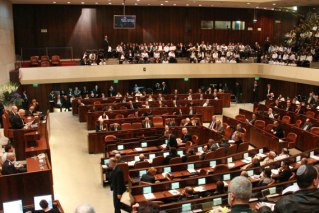 The Knesset plenum, photo by Itzik Edri
The Knesset plenum, photo by Itzik EdriLast night (11 July 2011), the Knesset plenum passed the Boycott Prohibition Bill in its final reading, with 47 MKs in favor and 38 against.
This law will enable the filing of civil lawsuits against individuals who call for boycott of settlement products. The Association for Civil Rights in Israel (ACRI) is strongly opposed to this unconstitutional law, and will therefore file a petition against it to the Israeli High Court of Justice demanding to disqualify this law. At the same time, ACRI is reviewing ways to protect Israeli individuals who will realize their constitutional right for freedom of expression, on any matter, and will be subsequently sued for damages.
The Knesset vote went ahead despite the fact that on the same day, the Knesset’s Legal Advisor, Attorney Eyal Yinon, warned that it constitutes a severe violation of freedom of expression and would likely fail to stand up to the challenge in the High Court of Justice.
Despite Yinon’s contradiction of Attorney General Yehuda Weinstein’s assertion that the law, while borderline, is constitutional after its amendments, the Knesset decided to go ahead with the vote and it passed.
ACRI has voiced major concern about this bill throughout its legislation process – explaining the dangerous precedent that it sets for limiting freedom of expression, which is not befitting of a democracy. The following are key points from ACRI’s position:
Israeli parliamentarians have referred to comparable anti-boycott US legislation in an attempt to green-light the process for passing the Israeli legislation. ACRI has put together a comparative analysis of the US and Israeli legislation, highlighting the major differences between the two laws – mainly that the US boycott ban restricts participation in a government call for boycott, and not individual calls or civil society calls. Furthermore, in the US the federal government is responsible for enforcement, whereas in Israel private bodies can sue for damages using this new legislation as grounds for the lawsuit.
Further background:
Full translation of the Boycott Prohibition Law
ACRI’s position on the bill, sent to the Chairperson of the Knesset Constitution Committee
ACRI info sheet on the Anti-Boycott Bill (February 2011)
A comparative analysis of the US and Israeli boycott legislation
ACRI in international media:
New York Times: Israel Bans Boycotts Against the State
AFP: Israel MPs vote through settlement boycott ban
BBC: Israeli lawmakers pass West Bank settlement boycott law
Reuters: Israel passes law punishing settlement boycotters
Guardian: Israel passes law banning citizens from calling for boycotts








Pingback: Association for Civil Rights in Israel to Petition High Court on Boycott Law
Pingback: Israel passes law banning calls for boycott - Political Wrinkles
Pingback: List of op-eds against the Knesset’s new boycott law at Judaism Without Borders
Pingback: Israel’s new law: suing Martin Luther King | Jewschool
Pingback: Israel Reveals Its Pathological Fear of BDS with Passing of Fascist Boycott Law « KADAITCHA
Pingback: BlackPrideNetwork » Blog Archive » Israel's new law: suing Martin Luther King | Jewschool
Pingback: Julia Chaitin: First They Came for the Boycotters | The Only Democracy?
Pingback: BlackPrideNetwork » Blog Archive » Israel's new law: suing Martin Luther King — updated | Jewschool
Pingback: Israel’s boycott law: The quiet sound of going fascist « Heptanews * Entertainment * Politics * Opinions * U.S. * Technology * Health * Leisure * World * Sports
Pingback: IL MITO “DEMOCRATICO” DEL RAZZISMO SIONISTA «
Pingback: Index on Censorship » Blog Archive » Israel’s anti-boycott law a grave threat to free expression
Pingback: Outcry over Boycott Law – Israel – Nobel Women's Initiative
Pingback: Israel and the anti-boycott law: the wider implications of popular indifference « Middle East atemporal